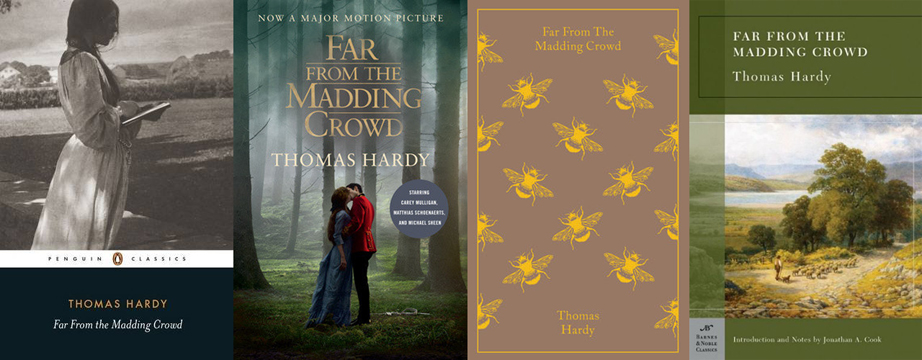
When you walk into a bookstore, the items on the front tables are usually brand new releases. But mixed among them, you’ll often find older works—some centuries old—that have resurfaced with the help of a little movie magic.
Classic novels deep on publisher’s backlists often have second lives when Hollywood admirers bring them back to the public’s attention. Take Far From the Madding Crowd—Thomas Hardy’s breakout novel is more than 140 years old, but it recently got fresh play in bookstores thanks to the charming new movie starring Carey Mulligan based on Hardy’s story of Bathsheba Everdene and her various suitors.
Once a book enters the public domain, which can vary depending on when it was written but is often about 70 years after the death of the author, anyone can publish an edition. That’s why a book like Far From the Madding Crowd has more than a dozen editions. On the other hand, newer books are usually protected by copyright, so only one publisher has permission to print them.
There are two ways to try to capture readers’ dollars when it comes to promoting old books with new movies. One is to partner with the studio to put out an official “tie-in” edition featuring the movie poster on the cover. This tie-in method has previously worked well for Vintage Classics, which has that deal for Madding Crowd. It saw the biggest sales boosts from tie-in covers in recent years in Jane Eyre, Anna Karenina, The Painted Veil and Mildred Pierce (an HBO mini-series). Likewise, Penguin Classics saw big boosts in tie-ins with Les Misérables and 12 Years a Slave in recent years, and it has upcoming tie-ins with movies including Madame Bovary and Testament of Youth. Sourcebooks is selling tie-in covers for Winston Graham’s Poldark series, the source of the show starring Aidan Turner now running on Masterpiece on PBS.
The second method is to simply promote classic editions that are already in stock. Barnes & Noble does this by placing copies of its own Barnes & Noble Classics edition on tables alongside the tie-in edition. “There are certain readers and certain bookstores that aren’t that wild about movie tie-in covers,” says LuAnn Walther, senior vice president and editorial director at Vintage, Anchor, and Everyman’s Library. The Hollywood-free cover art appeals to those purists. Knopf sometimes tries to capture some of those readers even when it does have the movie tie-in edition by also promoting a hardcover edition with a traditional design.
Sales boosts for classic novels-turned-movies can carry through Oscar season, DVD releases, and even when the movie airs on HBO or other premium channels, Tim Flannigan, a buyer for Barnes & Noble, says. Sometimes, a movie does so well that it even helps move merchandise that’s only related in a secondary way. When Alice in Wonderland came out, there was enough demand for Barnes & Noble stores to put together an entire table devoted to the book, including children’s editions, gift editions, paperbacks and related goods. Julia Child’s memoir My Life in France did fine for Knopf Doubleday when the movie Julie and Julia debuted, but her classic cookbook Mastering the Art of French Cooking, Vol. 1 did even better—it sold half a million copies within a year of the movie’s release, according to Russell Perrault, VP/executive director of publicity & social media at Vintage, Anchor and Everyman’s Library.
The amount that publishers and booksellers can expect sales to increase will vary greatly depending on the book’s previous popularity, the quality of the film, the celebrities attached and other factors. Walther says in the broad scheme of the 300 titles she releases each year, sales of classics with new movie adaptations “isn’t going to make or break any particular year for us.” Nevertheless, “it’s wonderful to have them”—and she wouldn’t mind seeing a few neglected classics with a cinematic feel get adapted for screen, like Sister Carrie and Half a Lifelong Romance, a modern Chinese classic she’ll print next year.
Many moviegoers and TV-watchers will see adaptations of classics without ever having read the original book, and with no intention of doing so in the future. But if even just a small handful of viewers turn to the page after watching, then the literary canon has triumphed. May Bathsheba Everdene and Ross Poldark grace many a summer reading list.
More Must-Reads From TIME
- The 100 Most Influential People of 2024
- The Revolution of Yulia Navalnaya
- 6 Compliments That Land Every Time
- Stop Looking for Your Forever Home
- If You're Dating Right Now , You're Brave: Column
- The AI That Could Heal a Divided Internet
- Fallout Is a Brilliant Model for the Future of Video Game Adaptations
- Want Weekly Recs on What to Watch, Read, and More? Sign Up for Worth Your Time
Contact us at letters@time.com